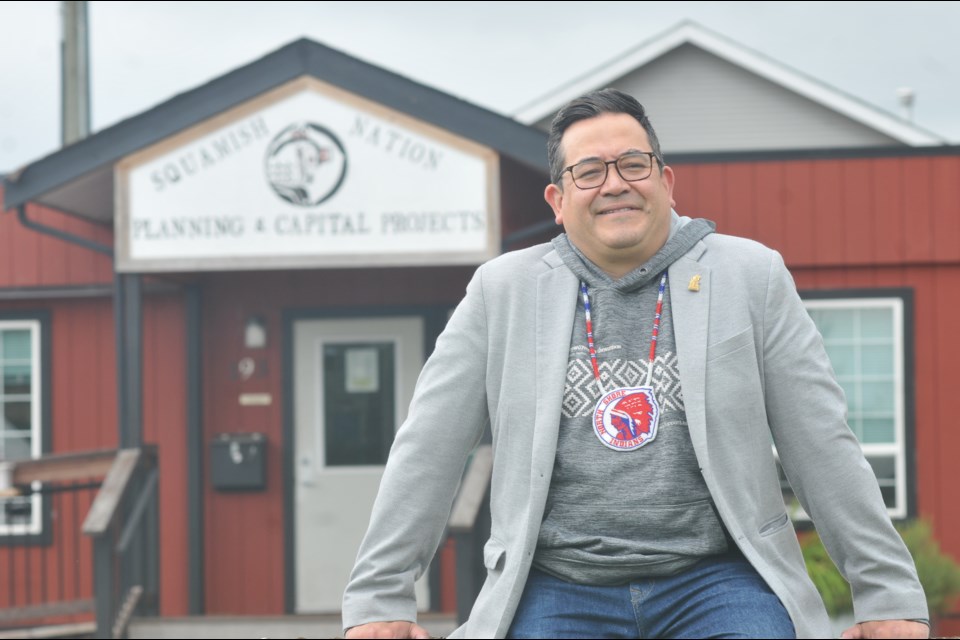Sḵwx̱wú7mesh Úxwumixw (Squamish Nation) is sending out figurative smoke signals to gather concrete data from, and empower, its members near and far.
After two years of preparation, the Indigenous community is launching its first census. The effort to canvas its 4,000 members will be done independently, so all the data will be owned by the nation as a result.
Squamish Nation launched the census Monday (July 18), which can be completed online or with an enumerator that comes to your door. According to the nation, it takes around 10 minutes for a single person to complete, or 30 minutes for a family. It can be filled out by any member 18 or older, and the deadline to complete it is Sept. 30.
The project is intended to help the nation with goals of documenting where its members live, improving services, promoting awareness, engaging with members and establishing data sovereignty.
To prepare, the nation’s director of Ta na wa Shéway I7x̱w ta Úxwumixw (planning and capital projects) Bob Sokol hired people with experience carrying out censuses in Indigenous communities. Within the past two years, administrative staff have received related training, and other members have been trained to be enumerators so strangers aren’t going door-to-door.
While the census isn’t mandatory, Coun. Sxwíxwtn (Wilson Williams) said members will be more comfortable with it than other government surveys, and will receive more one-on-one support to complete it.
“Challenges we face are not represented on [other] censuses,” he said.
"Indigenous communities across Canada face the challenges of poverty, substance abuse, the feeling of being stereotyped," Williams continued. "We've been doing so much research, we've been doing so much information gathering and preparation. We got a great team that really put a good package together that I feel is going to connect to our people in a deep and meaningful way where they'll be proud to fill it out, but at the same time, they know they're going to be heard."
Williams said they want to know what everyone’s needs are, and the survey is customized to do so. It will help Squamish Nation identify needs and priorities to take informed actions, as well as inspire other Indigenous populations across Canada to carry out their own data gathering.
Around half of the nation lives off reserve, so in part the census is a tool to engage its membership worldwide and make them feel a part of the process. With a growing population – 40 per cent of members are under 30 – Williams said they want to make sure youth are heard from as well.
Smoke signals: getting the word out
On the census webpage, you can hear “auntie” Vanessa Campbell pronounce its name Eslhílhkw’iws Chet, which translates to, “We are all related.” This connects people right to the language, which is a cornerstone of Squamish Nation culture.
Williams explained that they’ll be using a number of tools to get the word out, and encourage everyone to complete the survey.
The communication strategy will use updated technology, and branding to promote a sense of pride in Squamish Nation. At the same time, a key factor in getting the word out is having their families be the smoke signals and word of mouth to family members nearby or who live further away.
"You know, my father-in-law speaks to his sisters who live down in the [United] States, and they live in different areas, and they go down and unite together. So we're encouraging that kind of conversation," Williams added.
As an elected official, Williams will also be reaching out to people personally. He’ll be promoting it at Amalgamation Day, a big event on July 23 at Xwmélch’tstn Field, where the census team will be sharing information about the project.
Williams said the project will also help Squamish Nation with ongoing missions to bring more members back home to reserve lands, and revitalize its mother tongue.
One of the census questions is whether members want to live in the community. In the next month, shovels will be going in the ground for three development projects which will provide over 170 new units as part of the nation’s housing strategy.
Members living off-reserve might not know about existing or new housing options. Williams said he wants all members to know they have a home, wherever they are.
Another question will ask members if they want to learn Sḵwx̱wú7mesh sníchim, the nation’s language. Williams expects positive responses to be in the 90th percentile. To bolster language learning, Squamish Nation has partnerships with Simon Fraser University, programs in the community and at local high schools, and has plans to develop immersion schools.
Come deadline day at the end of September, Williams hopes to have good feedback and participation rates to share.
"There's always been comparisons around when you live on reserve our off reserve – how there's inequality to programs and services. We want to fill those gaps," he said, "to better meet the needs of all of our people."
[email protected]
twitter.com/nick_laba




